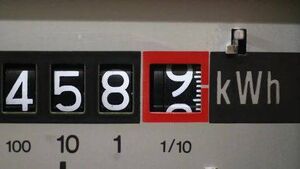Godfrey's Gospel: Pay As You Go bill is a shocking waste

Why would anyone in their right mind knowingly opt for a more expensive option?
I LOATHE the phrase ‘shop around’ when it comes to looking for a ‘deal’ for energy, life insurance, mortgage rates, Health insurance, house insurance, car insurance – the list goes on and on.
But as much as I hate to admit it, those wise old owls who do so are right and the rest of us are fools. And it would appear I am a giant fool – at least when it comes to paying my ESB bill.
Back in the dark days of the Celtic tiger recession I, and many people like me, found myself strapped for cash. Putting food on the table was a chore to say the least and keeping up with the bills became a mammoth task. People fell behind on everything – including the ESB bill – me included.
There were times when I feared disconnection altogether, but give credit where it was due, the people tasked with the unenviable task of collecting money on behalf of the ESB, Electric Ireland, or whatever you want to call them, were very understanding.
But to be truthful it was coming between me and my sleep so over 10 years ago, when they offered me the option of going on Pay As You Go, I jumped at it. The thought of having no more bills appealed to me and the arrears on the account would be clawed back by them taking a percentage of whatever I put into the meter.
Happy Days. In no time at all there were no more arrears, no more bills and no more phone calls or the fear of disconnection. I couldn’t ask for better. But it would appear I have been paying dearly for that peace of mind for over 10 years.
Last week, having read that there were over 300,000 people in arrears on their electricity bills – and remember the ESB is the sole provider of electricity in this country – with almost 180,000 of those 90 days or more in arrears, I wondered why more people would not opt for Pay As You Go. It would be one of many headaches removed from the equation.
Where better to enquire if that service offered value for money than to contact customer service directly and ask was my tariff equal, better or worse, than what people on Bill Pay were charged.
Sadly, I was told I pay two cent more per unit than if I was on Bill Pay and paying by direct debit. In other words, I am being charged more for paying in advance for my electricity than a person who runs up at least two months credit.
I failed to understand the economics of that, so the patient customer agent tried to explain it was probably because of all the ancillary charges, such as the maintenance of the meter, etc.
But in over 10 years no one has ever called to check on the meter to see if it is working or not. The company doesn’t have the added bother of applying to the bank for payment every two months or sending me out bi-monthly statements. In fact, they have to do absolutely nothing and get paid in advance before I use one cent of their electricity.
When I asked the agent if I was right, thankfully the person at the other end of the line had the good sense not to say anything or antagonise me even further, because as we spoke I had been doing a quick calculation in my head only to discover that I pay an extra €15 a month for my peace of mind in not receiving a bi-monthly bill – and had literally wasted €1,800 over the past 10 years.
I know life is not as simple as that – ask anyone former smoker if they are any better off (I am such a person, by the way) now that they no longer have to hand over almost €20 to buy a packet of cigarettes and they will quickly tell you they are not.
No doubt I would have found some way to spend – or waste, take your pick – this €15 per month, but I would have liked to have had the option to do so instead of being charged for something I genuinely believe makes no sense.
Correct me if I am wrong, but the whole concept of Pay As You Go is supposed to help people who are struggling to pay their bills and maybe help them focus the mind as to whether there are cost savings to be made in relation to the usage of some of their electrical appliances – just like the idea of day, night usage and when it is most cost effective to do the washing, etc.
But to simply load on a more expensive tariff because they can defeat the entire purpose. If people are struggling to pay a bill, why would anyone in their right mind knowingly opt for a more expensive option?
In hindsight perhaps I should have had a few more sleepless nights – at least I would have had €1,800 to spend on them.




